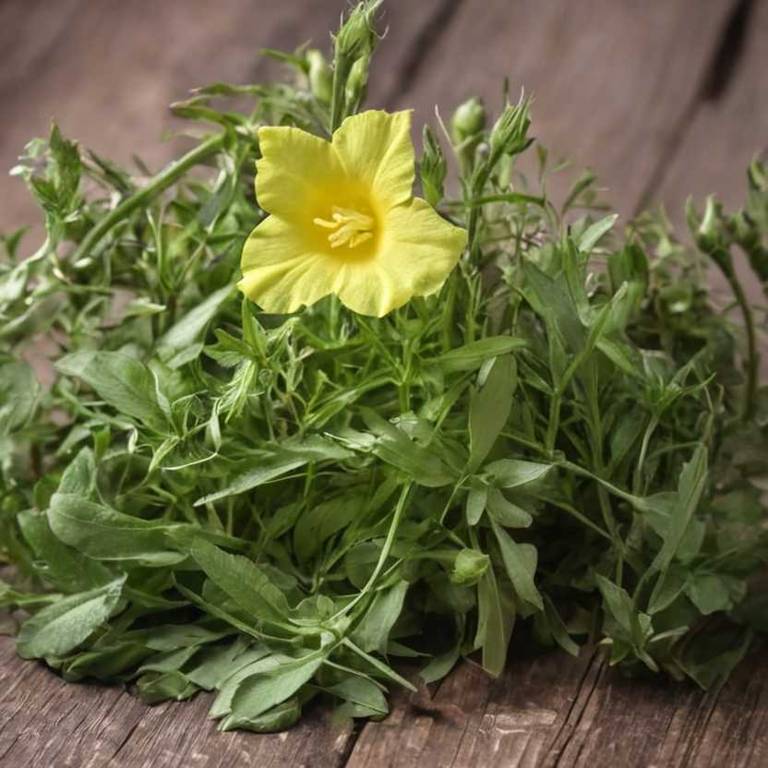Evening Primrose (Oenothera biennis)
Evening Primrose (Oenothera biennis) is a member of the Onagraceae family, native to North America, and Europe. Traditionally, its flowers, seeds, and leaves have been used for infusions, decoctions, and oil infusions.
This herb is particularly valued for its anti-inflammatory, diuretic, and expectorant actions, and has a long history of use in european herbal medicine, native american herbal medicine, and traditional chinese medicine.

Quick Facts / Key Information
| Common Name | Evening Primrose |
|---|---|
| Scientific Name | Oenothera biennis |
| Plant Family | Onagraceae |
| Genus | Oenothera |
| Species | biennis |
| Native Range | North America, Europe |
| Plant Parts Used | Flowers, Seeds, Leaves |
| Primary Medicinal Actions | Anti-Inflammatory, Diuretic, Expectorant |
| Primary Traditional Systems | European Herbal Medicine, Native American Herbal Medicine, Traditional Chinese Medicine |
| Historical Preparation Methods | Infusion, Decoction, Oil Infusion |
Botanical Identity
- Scientific Name
- Oenothera biennis
- Common Name
- Evening Primrose
- Synonyms / Alternative Names
- Common Evening Primrose, Oenothera, Showy Evening Primrose
- Plant Family
- Onagraceae
- Genus
- Oenothera
Botanical Description
- Growth Habit
- Perennial herbaceous plant.
- Height
- 1.5 to 2.5 meters tall.
- Leaves
- Broad leaves with upper surface glaucous green and lower surface white to pale green, bearing prominent stomatal bands.
- Flowers
- Flowers are yellow to orange, actinomorphic, solitary, with four petals and four sepals, having a prominent central disc and stamen whorls.
- Stems
- Cylindrical, ribbed, and glabrous stems with opposite branching, exhibiting a branching pattern of opposite arrangement and a surface characterized by smoothness.
Traditional Uses / Historical Use
Traditional Systems
- European Herbal Medicine
- Native American Herbal Medicine
- Traditional Chinese Medicine
Historical Preparation Methods
- Infusion
- Decoction
- Oil Infusion
- Poultice
Medicinal Actions
- Anti-inflammatory
- In herbal literature, noted as a calming anti-inflammatory, in inflammation-focused discussions.
- Diuretic
- In herbal texts, considered a mild diuretic, in cleansing-oriented uses.
- Expectorant
- Commonly referenced as a cooling expectorant, in respiratory system contexts.
- Tonic
- As described in traditional systems, a moderate tonic, in whole-system applications.
Active Compounds
- Flavonoid
- A chemical class commonly identified in plant tissues, especially flowers and leaves.
- Terpenoid
- A diverse group of organic compounds present in many aromatic plants.
- Phenolic Acid
- Organic acids commonly occurring as part of plant secondary metabolism.
- Glycoside
- Secondary metabolites formed through glycosylation processes in plants.
Modern Research Overview
Scientific literature concerning this plant spans multiple areas, including phytochemistry and laboratory research. Detailed analysis of published studies is not included at this time and will be added as part of future editorial expansion.
Safety & Contraindications
- General Precautions
- Precautionary considerations have been reported in relation to this herb.
- Contraindications
- There is insufficient evidence to determine specific contraindications related to this herb.
- Allergies
- Sensitivity or allergy-related effects have not been clearly established.
- Drug Interactions
- There is insufficient evidence to determine whether this herb interacts with pharmaceutical drugs.
- Toxicity
- Toxic effects associated with this herb have not been well documented.
- Pregnancy & Breastfeeding
- Information addressing pregnancy and breastfeeding-related safety for this herb is limited.
Preparation & Usage Methods
- Infusion
- Water is poured over plant material and allowed to steep before straining.
- Decoction
- A preparation method involving prolonged boiling of roots, bark, or dense plant material.
- Poultice
- Plant parts are crushed or moistened and placed directly on the body.
- Infused Oil
- Oil infusions capture plant compounds using lipid-based solvents.
- Tincture
- Plant material is macerated in alcohol to create a concentrated liquid extract.
Growing, Harvesting & Storage
Growing / Cultivation
- Soil
- Prefers loamy soil with well-drained conditions. Typically grows best in organically rich soils.
- Sunlight
- Thrives in full sun. Tolerates full sun to partial shade.
- Watering
- Prefers well-balanced moisture levels. Tolerates periodic dry conditions.
Medical Disclaimer
The information provided on this page is for educational and informational purposes only. It is not intended to diagnose, treat, cure, or prevent any medical condition. Always consult a qualified healthcare professional before using any herb for medicinal purposes.